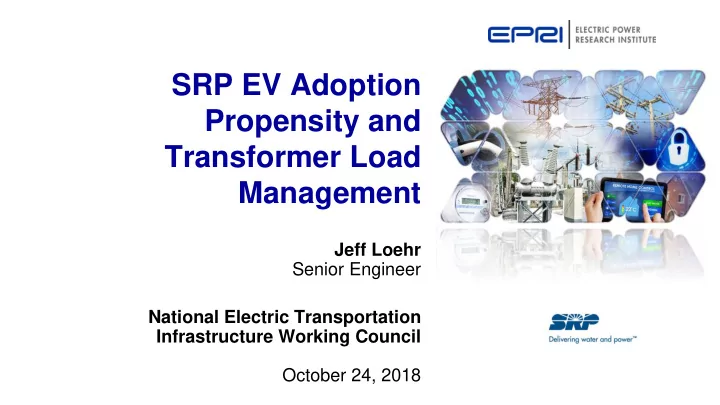

SRP EV Adoption Propensity and Transformer Load Management Jeff Loehr Senior Engineer National Electric Transportation Infrastructure Working Council October 24, 2018
Project Goals Propensity to Adopt – Translate system wide corporate EV forecast into locations – Identify possible problem areas Transformer Load Management (TLM) – Speed up analysis to identify transformer overloads caused by EV charging clusters Both are focused on residential charging 2
SRP System Information Metering Over 1.07 Million meters – 60% have 15-minute interval kWh data – 38% have 15-minute interval kWh, kVarh and average voltage Service Transformers 163,000 banks comprised of 173,000 units 78% are pad-mounted 33% are 50kVA single-phase transformers 33% are 75kVA single-phase transformers 3
Background Expected Growth of Maintain System Strategy DER and EVs Reliability 4
Predictive Analytics Corporate Forecast Customer Propensity + Locations Model 5
Customer Propensity Model Data Machine learning Random forest Known owners of EV and PV Demographic data Model Find customers with similar Score each customer’s attributes as known adopters likelihood of adoption 6
EV Adoption in the Service Territory Service Transformers with EVs A more granular look…. 30,000 18% 16% % of Service Xfmrs Fleet 16% 14,000 15% 25,000 14% 13% 12,000 11% 20,000 12% 10,000 10% # Service Xfmrs 10% 8,000 15,000 8% # Service Xfmrs 26,652 8% 7% 6,000 23,706 5% 20,892 10,000 6% 18,251 4,000 4% 15,684 4% 3% 13,200 10,917 5,000 2,000 8,742 6,682 2% 4,985 0 0 0% 1 2 3 4 5 6 7 8 9 10 2017 2018 2019 2020 2021 2022 2023 2024 2025 2026 # Electric Vehicles 7
Validating EV Growth Forecast 8
EV Model Performance SRP has ~ 1,400 feeders in the service territory 9
EV Model Performance (cont’d) • 153 EV adopters (Oct 2017 – Dec 2017) • 76% have scores in the top 25% Top 25% Scored ~1 million existing, residential customers in the service territory 10
Lessons Learned No immediate concerns for system reliability Limitations with propensity modeling Collaboration between data scientists and business areas Need to prepare for the future 11
Transformer Load Management (TLM) at SRP Prior to interval data First implemented at SRP in 1960 – Run annually until 1993 – Run weekly 1994-2015 Methodology – Monthly billing kWh energy Estimate peak kW demand – kW demand for some commercial / industrial customers – Coincidence factors – Assumed 85% power factor 12
Transformer Load Management (TLM) at SRP Interval data Started in 2015 Use interval data where available – Increasing over time Improved power factor estimation Fall back to old methodology Run daily Overloads evaluated annually 13
Transformer Load Management (TLM) at SRP Thermal modeling No longer fall back to old methodology Identify bad interval meter reads Estimate interval data where missing IEEE C57.91 Simple model – Need model for each size/type New overload criteria – Hotspot temperature Overloads evaluated within 10 days 14
Transformer Load Management (TLM) at SRP Transformer A Peak Load 164% Peak Hotspot 143 °C Transformer B Peak Load 182% Peak Hotspot 142 °C 15
Electric Vehicle Impacts 2017 study Thermal modeling Thermal overload criteria Sample load profiles Various charging start times Assume uniform distribution of EVs across transformer fleet 16
Electrical Vehicle Impacts Scenario A No EVs Peak Load 116% Peak Hotspot 97 °C Scenario B 6 EVs charging at 4pm Peak Load 172% Peak Hotspot 127 °C Scenario C 6 EVs charging at 11pm Peak Load 126% Peak Hotspot 97 °C 17
2017 Study 75 kVA Transformers 18
2017 Study 50 kVA Transformers 19
Ongoing and Future studies Combine propensity and thermal modeling Best/worst case analysis – On peak charging – Off peak charging Detailed studies – Vehicle type – Charging start time based on arrival time and TOU likelihood – Charging duration based on miles driven – Multiple vehicles per household 20
Thank you for your attention Any Questions? Contact Information: Jeff.Loehr@srpnet.com 21
Recommend
More recommend